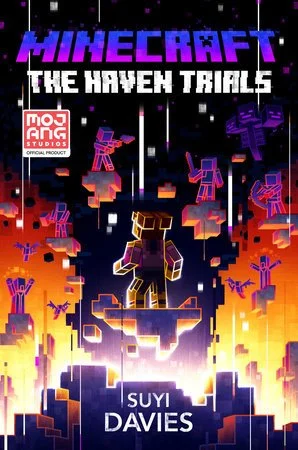The Haven Trials are my trials
I borrowed my first book from a public library in 2017. It was the Luton Central Library in St George’s Square, my first in a city outside my native country. Not that I hadn’t visited libraries or borrowed books before then. Just that, for 28 years, I did not have access to a library that let me take said books home.
I’m often envious of other writers who fell in love with books through visits to the library/bookstore as a kid/teen. In 90’s Benin City where I grew up, there were two main ways to get books as a kid: get your parents to buy them, or borrow from a friend (often girls, because most boys thought reading was anti-masculine). Public libraries in my city were rare or simply nonexistent, and school libraries didn’t let students borrow books for fear they’d never get them back (mine only allowed us spend 15 minutes at a time, and only looking at textbooks), Neither stocked children’s books as a port of call. Unless one had middle-class parents or friends to buy/lend those books, reading for fun as a kid easily became out of reach.
Luckily for my siblings and I, my parents tried their best. A mix of new and used books for kids sat on our small shelf. Remember, at this time, there was no such thing as middle-grade (books for 8 to 12-year-olds) or young adults (13-18). This meant we pretty much read across a spectrum. Enid Blyton’s Famous Five and Hardy Boys, Goosebumps, etc. were books aimed for what we’d now think of as middle-grade readers, and I got a few of those. Later came the novels for older teens: Nancy Drew, Sweet Valley High, Lemony Snicket, The Midnight Club--mostly from used bookstores. I loved and enjoyed these books, but they often lacked something: I could barely imagine myself being like the kids in them.
For school, we got to read stories about Nigerian kids & teens that were mostly moral-driven in the same manner as many early British novels: Chike & the River, Eze Goes to School, Sugar Girl, The Drummer Boy, Without a Silver Spoon. What I remember most about these books was that whatever little frivolity present was represented as mischief, with a lesson to be learned. Those we read that didn’t do this weren’t quite targeted at children: Shakespeare, Dickens, Chinua Achebe, Chukwuemeka Ike. A few had some adventure, but overall, I did not come away thinking of them as happy or exciting.
I wanted happy and exciting. I still want happy and exciting. If not for me, then for the 8 to 12-year-old Nigerian, African or Black kid in 2021 who wants to witness something remotely close to their everyday life represented in stories. So I decided to go out and write it.
Minecraft for the roads less traveled
When Mojang contacted me and asked if I was interested in writing a Minecraft novel, I was conflicted. Sure, I’d written stories for children before, but this was a whole novel, set partly in the world of a video game I’d only played in passing. But I took on the task for the reason I stated earlier. I saw Minecraft as an opportunity to insert Black, Nigerian kids into a global space where they wouldn’t often be the first faces you’d think of when you imagine the those who like and enjoy Minecraft. Some kid in Nigeria, chugging away on their phone or PS4 isn’t the image of the Minecraft gaming community, and I wanted to see if I could change that. If the internet is a great equalizer, perhaps our stories can be too? An open world game like Minecraft means that you're just as likely to run into anyone from Chicago as well as from Lagos or Kuala Lumpur or Peckham or anywhere else in the world. In the same way, I wanted it to be that if any child picks up a Minecraft novel, they could also randomly run into the story of any kid from anywhere in the world.
This gave birth to Cece Alao and The Haven Trials.
It was no easy task, this. I did tons of research by playing hours of the game, watching YouTube playthroughs, and consuming info from Minecraft wikis and forums. I strategized battle plans, outlined inventories required to defeat certain monsters, and wondered what Minecraft avatars did when their players were Away From Keyboard. I discovered what starting junior secondary school in Lagos looks like in 2021, what subjects would be the toughest for the main character Cece, and how she spent her time in her parents’ estate. My aim was to capture the humanity behind the kids who play these games; how their quests for friendship, selfhood and meaning are valid no matter where in the world they're situated.
It was a fun, rollicking adventure writing the book, and I can gladly say I’ve found my happy and exciting in the course of doing so. Now, The Haven Trials hits shelves in a few days. Here’s hoping that all who read it--especially kids like this little boy from 90’s Benin City--find their happy and exciting within it too.
You can read a free excerpt right now. You can even listen to a short clip from the audiobook, narrated by Nigerian-American actor, Sandra Okuboyejo. You may buy or borrow or lend your copy to a friend. You may ask your local bookstore or library to stock it. Whatever way you choose to open your arms to this book, know that someone is receiving some happy and exciting. Even if that person is you.
